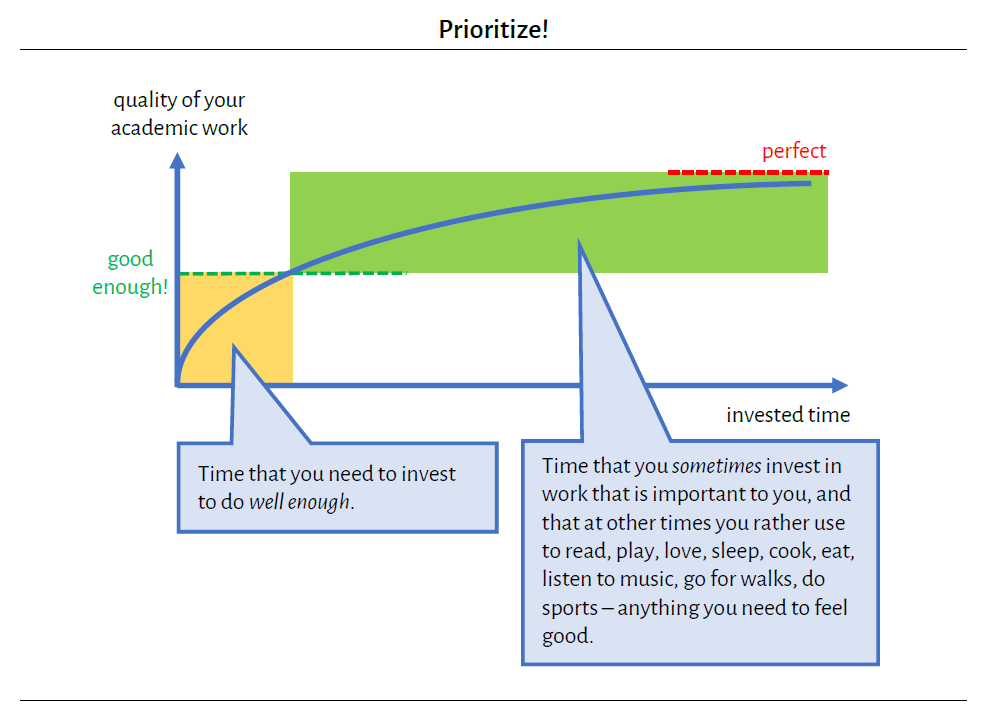On ‘embracing mediocrity’
Students often have an unhealthy all-or-nothing attitude toward their work which increases stress levels. They relax a bit when they learn to prioritize their work and allow themselves to ‘embrace mediocrity’ on low-stakes tasks to save time and energy. / Deutsche Version: ‘Mittelmaß’ anstreben.
In my seminars I regularly address issues of time management, self-care, and mental health because I observe that students increasingly suffer from alarmingly high levels of pressure, stress, and anxiety.
Part of what I try to teach students in these sessions is a more conscious attitude toward the fact that they only have to do ‘well enough’ to pass the bulk of their obligatory course work, which is ungraded: In many cases, much of the pressure students feel stems from an imperative to submit their absolute best – which easily becomes overwhelming when paired with a high number of courses which many students register for to finish their studies quickly.1
What students often lack are the strategies to prioritize their time and effort, to focus their energies on important tasks (graded or otherwise high-stakes) and to save some energy where excellence simply doesn’t matter as much. Many students don’t think they can allow themselves to half-ass tasks however mundane – their mentality is all-or-nothing. But when the yard stick is perfection, even completely reasonable pass requirements seem impossible to achieve en masse, and the result is courses dropped or failed, self-esteem crushed, and anxiety levels soaring.
So, what I tell them under the only-half-joking heading of “Embrace mediocrity!” is that, on the one hand, they are allowed to invest less work in less important tasks, and that, on the other hand, strategies to recognise when work is simply ‘good enough’ is a necessity for proper self-care.
I draw them the following graph on the board to illustrate how investing more and more time into a piece of work yields exponentially diminishing returns on quality, while reaching a quality that is ‘good enough’ doesn’t actually take that much time. Investing a lot of time in high quality makes sense only for high-stakes tasks. And the time that is saved by embracing mediocre quality for work that doesn’t need to be great can be spent better, for example on self-care.

Of course, this is a simplification. But I know from countless feedback sheets I have received over the last years that this little graph and my corresponding ten-minute talk on priorities has an enormous effect on students. It enables them to recognise four things:
- the potential for self-harm in aspiring to constant perfection,
- their agency in allocating their time where it is necessary,
- their agency in defining themselves what ‘necessary’ means at a given moment in their lives,
- the benefit of ‘having time’ for things that are just as important, and often more so, than achieving excellence at university.
I tell my students that I do not expect them to perform their ‘best’ measured by the yard-stick of perfection but that I accept every performance as their ‘best’ by the yard-stick of current individual capability, which may vary from student to student and from one phase in life to another
The fact that I as their lecturer say this is a huge relief to many. As self-evident as it would seem to me and many of my colleagues, it needs to be spoken out loud.
Then students begin to relax a bit. Then they begin to spend their energy where it counts.
-
The reasons for this imperative are manifold: Many students self-identify as ‘perfectionists’, which I think is one of the most self-destructive labels there are (see The poisonous perfectionist vs the constructive critic). Public discourse in Germany frequently creates horror scenarios of guaranteed unemployability for those who exceed the ‘standard period of study’ or who fail to achieve an excellent grade point average. And, of course, academia itself reproduces a competitive discourse with little respect and empathy shown those who cannot – for whatever reason – perform their best at all times. ↩︎
Kommentare
Katharina Pietsch
3. Dezember 2019
I still remember that for me one of the best things in going to the Oberstufenkolleg after years of suffering from the meaningless-while-high-stakes learning environment of my secondary school was that I finally had the freedom to prioritise. As there were no grades at the Oberstufenkolleg at that time and there were only pass requirements for classes, I could choose to do the bare minimum for one class and put a lot of work into another without being punished for these choices. For the first time in my life, I felt like my education was actually mine because I was able to make choices about it and exercise agency in regard to it.
Speaking of ‘freedom to prioritise’: I can imagine that for many teachers giving students licence to “embrace mediocrity” is no different from telling them we don’t care whether they are delivering half-assed work or that we even encourage constant half-assing. That’s not how I think about it at all, because I believe that only when people are free to say ‘no’ to something are they free to say ‘yes’ to it, too. So only when students have the license to deliver mediocre work do they have the freedom to actually deliver excellent work.
Füge einen Kommentar hinzu